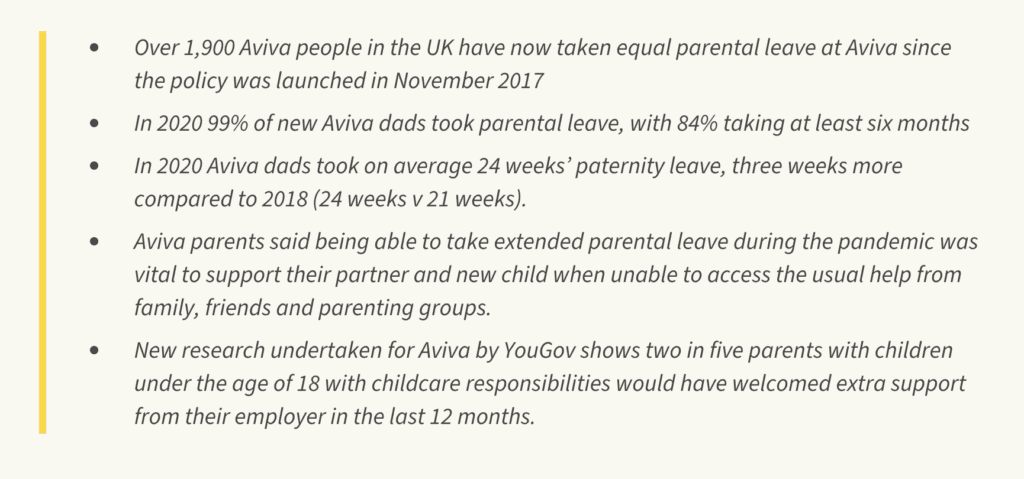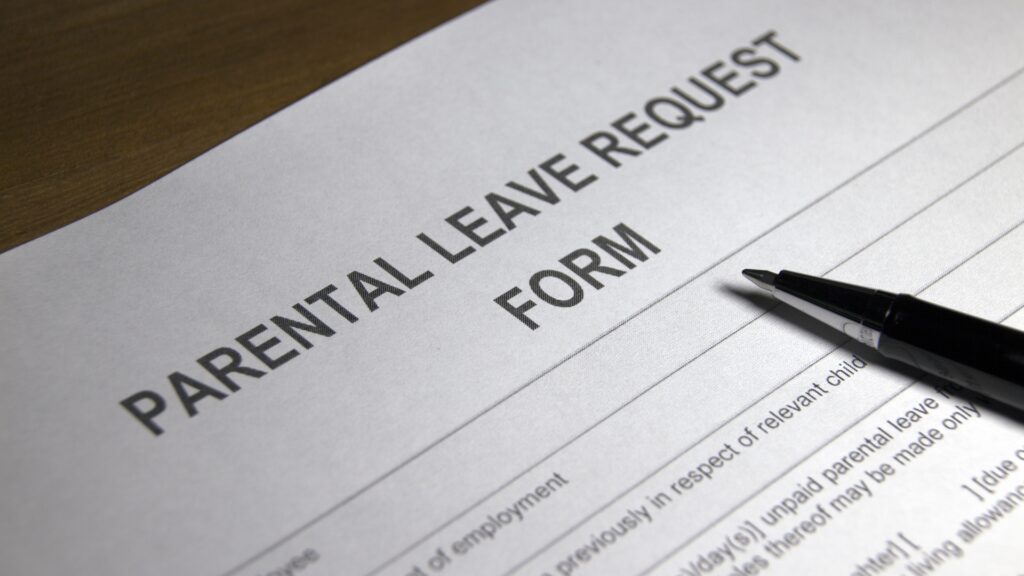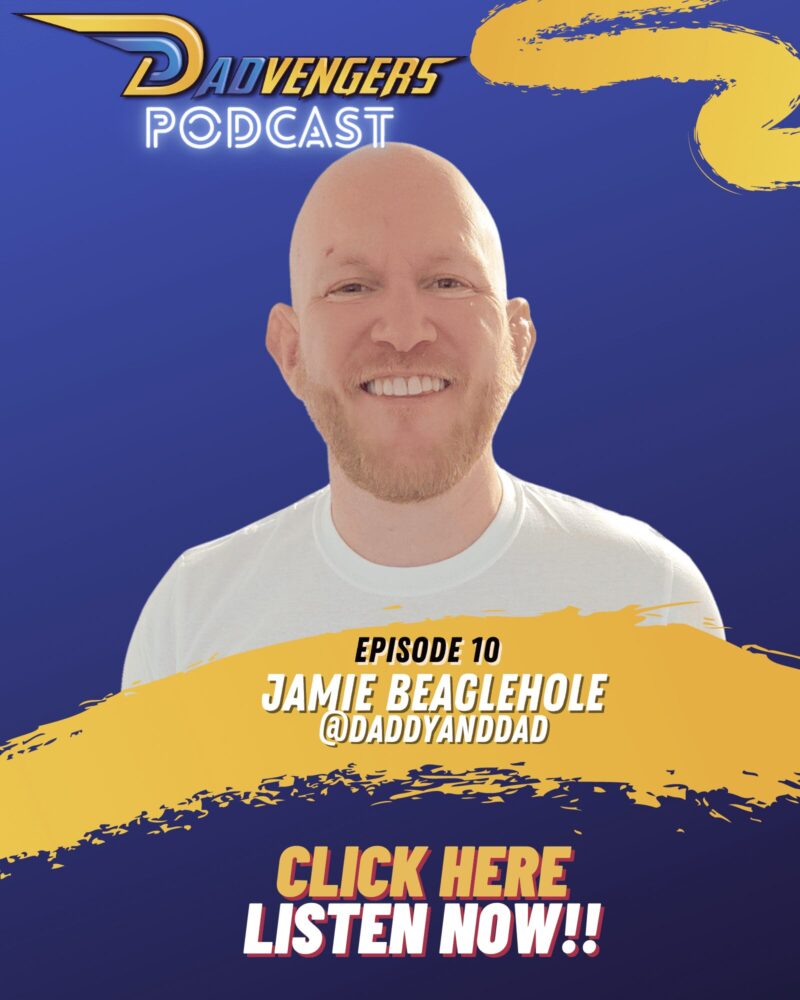Aviva have scrapped paternity leave! They realised it was an outdated and unfair system. So they changed it! Anthony Fitzpatrick, Head of colleague Experience and Employment Policy at Aviva tells us about the change to the entitlement. And Rob Simpson, a dad who works at Aviva, shares his story of taking all the time he needed to adjust to being dad!
In 2017 Aviva got rid of paternity leave and introduced equalised parental leave . We provide 52 weeks off upon the birth of a child. 26 of which are at full pay. This policy covers people of all genders.
A range of things sparked our decision to take this step. We felt employer policies were increasingly out of step with family lives and that our approach should reflect our values. We also saw the opportunity to ‘de gender’ care as good not only for women’s careers, but also men who we wanted to support to play a greater role in their children’s lives. Finally, we also felt it would send a strong signal about the kind of business we are – showing customers and employees that as an organisation, we believe in supporting our people of all genders to manage paid work with raising families.
A Simple, Equal Policy!
From the outset we decided it needed to be simple and clear; a lot of policies around parental leave can be quite complex to understand. We also took a very deliberate approach to showcasing the new policy as part of a wider cultural transformation journey, enlisting senior leaders led by our CEO to promote our new approach. We continue to profile people across the business taking the leave; and when employees return we ask them to become advocates of the policy

Since its launch, over 1,900 Aviva people in the UK have now taken equal parental leave. This includes 643 employees who took it last year, despite more families being based at home in 2020. And 99% of new Aviva dads took parental leave, with 84% taking at least six months. One dad from Aviva, Robert, tells us why this was such a great policy for him:
Robert’s Equal Parental Leave Experience.
The initial process of becoming a father was a bit strange. My wife was induced, so we went to the hospital fully expecting to come home with a baby. When we arrived my wife was taken to pre-assessment. I stayed outside because of COVID. Thereafter I spent the afternoon sat in the hospital canteen waiting for news. Alas at the end of the day there were no delivery suites were available, so we were sent home and told to have our phone on.
At half past midnight the hospital called. They had a suite, so we set off again. It was an odd feeling driving in knowing that we’d have a child when we came back. I stayed with my wife throughout labour in the delivery suite. Although I felt like a spare part for some of it, being there for my son’s birth was incredible.
After the birth my wife was taken to recovery and I had to go home. That night was really odd – I didn’t know how to react; I was emotionally and physically shattered, the fact I was a dad hadn’t really registered to me. It didn’t really register until the next day when I picked up my wife and child.
Taking 6 Months Paternity Leave.
The fact that Aviva have a policy that allows me to take 6 months full pay for paternity leave is great. I didn’t realise how phenomenal a policy that was until I had my son back with me. The first 2 weeks or so were a mixture of stress and panic. I was convinced I was doing something wrong. I constantly felt guilty because I was getting frustrated with my son (when he just wouldn’t sleep!). This was compounded by lack of sleep, and the national lock down meant we had no support.
However, taking the leave did mean I didn’t have to be worried about my performance at work. It helped my wife and I to get used to our son (and him to us) and develop a coping strategy.
I can’t imagine taking just two weeks, leaving my wife at home with the new baby after 14 days wouldn’t have felt right! She needed time to recover from the birth, and we both needed time to adjust to being a parent!
Adjusting to Parenthood
For the first 6 weeks or so we operated on sleep shifts – we’d try and get spells of 2 – 3 hours separately. This helped with our mental wellbeing as although not all the sleep we needed it certainly helped us function.
As I was at home, I could take my son out for walks if it all became a bit much for my wife. Just giving her an hour or so off really helped.
After 6-8 weeks I found that I started to enjoy my son a bit more – he started to become more interactive and began to learn how to sleep. I wouldn’t swap this bonding time for anything in the world. Being able to see his development daily was magnificent and terrifying in how quick he changed.
It is something I miss now that I’m back at work, but luckily my wife is a prolific photographer, so I don’t miss much!
Returning to Work After Paternity Leave
In terms of work, when I went on parental leave, I was a little concerned about my job. Although I knew my job was safe, I didn’t know how it would change whilst I was off. Luckily my manager was very good at staying in touch and let me know about developments.
Going back to work was tough – even though I was working from home. I was apprehensive I’d forget everything I used to do. I was pleasantly surprised that it came back (very much like muscle memory). It probably took around 2months before I’d say I was fully back to speed.
More About The Policy
Through the pandemic it’s been a vital policy to support new parents, whose lives have changed during the most dramatic of times. In fact, this policy proved essential to colleagues while support networks, such as grandparents and parenting groups, were unavailable over the last 12 months.
And with hybrid and remote working now becoming the norm, key challenge is that those with caring responsibilities – who are more likely to be women – become less visible unless organisations act. Our hope is that policies like equal parental leave help to balance caring responsibilites between genders and remove any gender-based or carer-based barriers to career progression.
Overall, the policy has been a great success with a positive impact on employee well-being and retention; we have had good feedback around staff feeling supported and encouraged to take time out. Especially paternity leave. Even beyond the people that use the policy, this has had positive impact on wider employee morale and motivation. The team know they work for a company that’s committed to helping our people balance all the different bits of their lives.
The policy obviously has a price tag, but we would encourage all employers to think about the steps they can take to ‘de gender care’; helping families in the here and now and the case of gender equality in the long term. This kind of approach can also lower costs around recruitment as people are more likely to stay with a business that recognises their needs at different life stages.
To read more about the policy direct from Aviva – click here.

The Dadvengers Paternity Leave Opinion!
So what do we think of this? We LOVE it! This is an amazing policy that allows all parents the time they need to bond with a new baby. The first few months of a baby’s life are the most formative and it is so important that dads get to share as much of that as they want.
We talk about these issues a lot on our Dad Chat’s and one thing that all dads tell us is “Two weeks isn’t enough”. They go back to work exhausted, stressed and feeling guilty about leaving their partner at home with a new baby to figure out. With companies like Aviva leading the way and changing the paternity leave system are essential to making the change we all need to see.
This policy gives parents the choice to decide what they want to do, and supports them to be the hands on parents we believe they want to be. We’d encourage all companies to think about implementing a policy with this level of flexibility.
Watch the relevant Dad Chats Live Episode
If you’d like to watch and listen to Rob talking about his experience of equal parental leave, don’t forget you can watch his guest appearance on Dad Chats Live. Our weekly parenting chat hosted on our Instagram Account.
Watch now>>>
This post is sponsored by Aviva.




















1 Comment